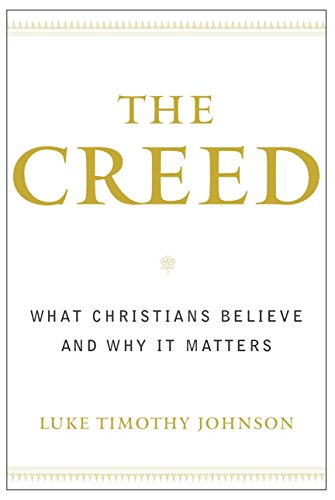This evening we begin our discussion of the Nicene Creed using Luke Timothy Johnson’s The Creed: What Christians Believe and Why It Matters. Please read the Introduction and Chapter 1: “Origins and Development.” Tonight we will be discussing your understanding of the Creed and the Biblical and Patristic antecedents to the Creed.
Every Sunday, we say the Creed immediately after the sermon. Although we will discuss the role of the Creed next week, for tonight think through why you personally say the Creed. What role does the Creed play in your liturgical life? Is its helpful or a stumbling block? Is it a time of engagement in worship or where you check-out between the sermon and the Prayers? If the Creed was excised from the liturgy, would you notice and would it make a difference to you?
We will also look at the early predecessors to the Creed from the Scriptural witness to the refinements of the early Christian writers. Johnson begins his discussion of the Creed with the Jewish Shema (Hebrew for “Hear!”) as contained in Deuteronomy 6:4-5. Johnson shows how this basic statement of faith is Communal, Exclusive, and Personal. We will look through some of the New Testament statements of faith, particularly Peter’s confession in Matt 16:13-20 and Paul’s proto-Creed in 1 Corinthians 15:1-7, and see how these creeds likewise have these same three elements. We may also review some of the great Christological hymns in the New Testament as contained in John 1, Philippians 2, and Colossians 1. If time permits, we will also discuss the second-century writings of Justin, Irenaeus, and Tertullian as that bridge between the Scriptures and the Creed. If you have the opportunity today, please read through the attachments (The Roots of Early Christian Mysticism, pp. 26-24 and The Spirit of Eastern Christendom, pp. 30-36) and notice this development.
Dinner is at 6. The menu is turkey burgers. Discussion about 6:45. If you haven’t read, please come anyway.
By this you know the Spirit of God: every spirit which confesses that Jesus Christ has come in the flesh is of God, and every spirit which does not confess Jesus is not of God. This is the spirit of antichrist.
1 John 4:2-3a.

